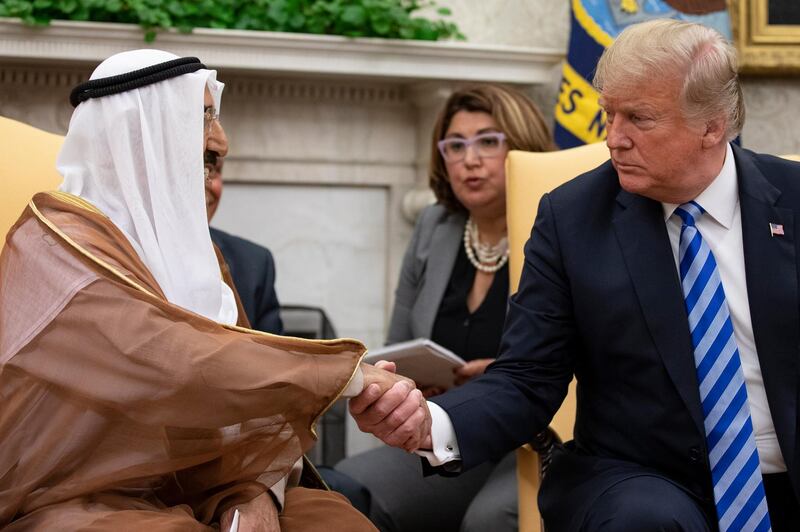President Donald Trump hosted Kuwait’s Emir Sheikh Sabah Al Ahmed for two hours in the White House on Wednesday, where improving bilateral ties on the economic and security fronts as well as the regional crisis were discussed between the two partners.
Unlike their 2017 meeting this one was not followed by a press conference. Instead, Mr Trump and Sheikh Sabah delivered opening remarks ahead of their meeting in the Oval Office.
Calling the Emir “a very special friend of mine”, Mr Trump thanked Kuwait for the warm ties between the two countries. “We practice large-scale trade together, investment together, and also, very importantly, fight against terrorism [together], and Kuwait has been a great partner.”
_______________
Read more:
Kuwait's Emir to meet President Donald Trump
Saudi Arabia and Kuwait to form co-operative council
_______________
For his part, Sheikh Al Sabah said his White House visit is a continuation of the “profound and strategic relationship between our two countries.”
The Emir also said the US and Kuwait are “working to reach an end to the crisis in the Gulf” which started in June 2017. He praised the efforts of the UN envoy to Yemen Martin Griffiths and the current talks in Geneva and hoped for a “solution to the Palestinian conflict”.
Commenting on regional matters, Mr Trump lamented “the tragic situation in Yemen, and in so many tragic areas in the Middle East.” He said bringing stability to the Middle East is “very hard” and compared it to “a very complex jigsaw puzzle.”
Singling out Iran, he said the country is “a very much different place from when I first took office. Iran is in turmoil right now. They’re in total turmoil. When I took office it was just a question of how long until they took over the entire Middle East. Now they are just worrying about their own survival as a country.”
“We’ll see what happens with Iran, whether they want to talk or not that’s up to them, not up to me. I will always be available, but it doesn’t matter one way or the other” Mr Trump said.
Iran’s currency plunged to a new low against the US dollar this week, and the US president is expected to chair a UN security council meeting later this month to increase pressure on Tehran.
Addressing the situation in Syria and the diplomatic stand-off between US and Russia over an expected Idlib assault, Mr Trump described it “as a very sad situation”, warning that “if it’s a slaughter [in Idlib] the world will get very angry and the United States will get very angry too.”
But it was trade, defence and commerce deals that were expected to top the agenda in talks between the two.
Kristin Diwan, a senior resident scholar at the Arab Gulf States Institute in Washington, told The National that “the meeting appears to be a continuation of the annual Kuwait-US strategic dialogue [that] begun in 2016.”
“It reflects the close ties and spirit of cooperation that persist across a wide spectrum of issues encompassing defence, the economy, and politics” between the two.
On the bilateral front, Ms Diwan said that “Kuwait has its own Vision 2035 plan aimed at diversifying their economy.”
Some of the advances of the current visit, she added, are “a focus on technology with Kuwait and the US signing a letter of intent to enhance cooperation in cybersecurity, and Kuwait and Amazon Web Services signing a memorandum of understanding to support the training of the Kuwait public sector in Cloud computing.”
Following the head to head at the Oval Office, Mr Trump and the Emir attended a large meeting with members of their cabinets. The Emir’s delegation included foreign minister Shiekh Sabah Khalid Al Hamad Al Sabah, interior minister Khalid Al Jarah Al Sabah, and minister of finance Nayef Falah Al Hajraf.
On the US side, chief of staff John Kelly, national security adviser John Bolton, director of national intelligence Dan Coates, adviser Jared Kushner, treasury secretary Steve Mnuchin, deputy secretary of state John Sullivan and others attended the meeting.





